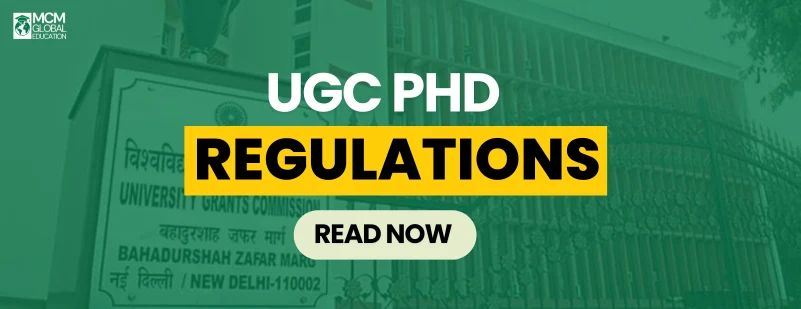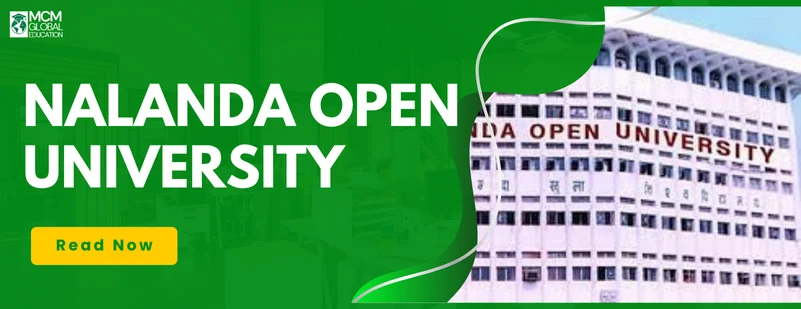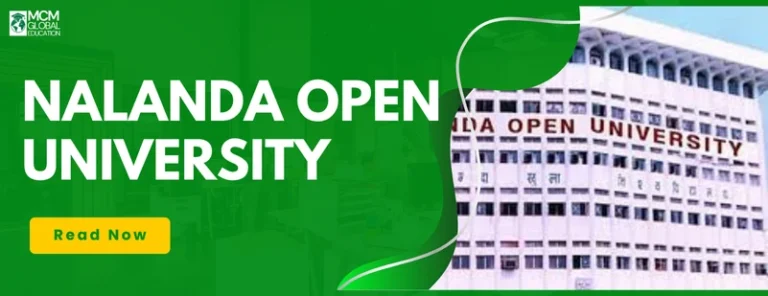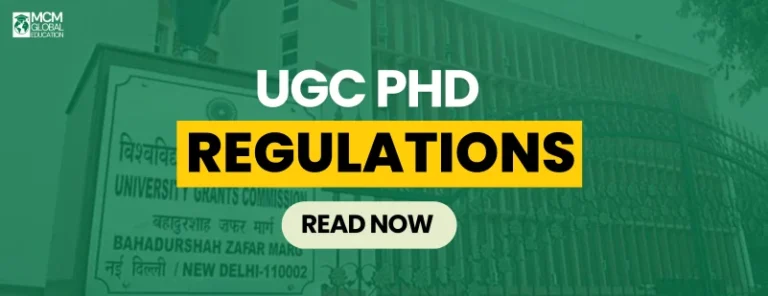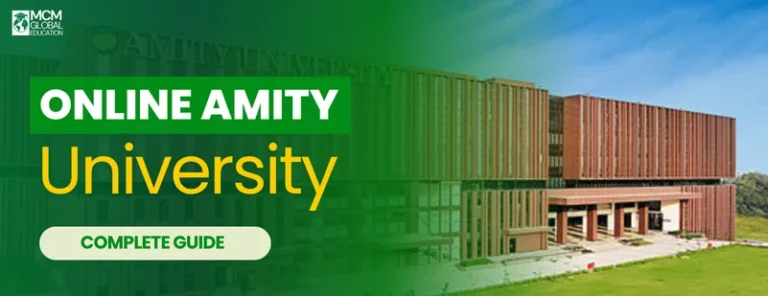Pursuing a PhD is one of the most prestigious academic achievements in India. To maintain quality, transparency, and consistency in doctoral research, the University Grants Commission (UGC) has established a unified set of norms known as the UGC PhD Regulations.
These regulations define every aspect of a PhD program — from eligibility and admission procedures to coursework, supervision, evaluation, and thesis submission.
The latest UGC PhD Regulations 2022 form the current basis for PhD programs across Indian universities. However, the draft UGC PhD Regulations 2025 are expected to introduce further updates aligned with the National Education Policy (NEP) 2020.
This comprehensive guide explains the UGC PhD Regulations in detail, helping aspiring scholars understand how to plan and complete their doctoral journey smoothly.
Table of Contents
Objectives of UGC PhD Regulations
The UGC PhD Regulations are designed to:
- Ensure uniform academic standards for doctoral programs in India.
- Promote quality research and prevent plagiarism.
- Encourage interdisciplinary and innovative studies.
- Enhance global recognition of Indian PhD degrees.
- Protect the rights and interests of research scholars.
These regulations act as a blueprint for universities and research institutions, setting minimum academic standards for every PhD program conducted in the country.
Key Highlights of UGC PhD Regulations
Here’s a quick summary of the major features of the UGC PhD Regulations 2025 (based on 2022 norms and proposed updates):
| Aspect | Regulation Summary |
|---|---|
| Minimum Duration | 2 years (excluding coursework) |
| Maximum Duration | 6 years (extensions allowed as per rules) |
| Coursework Requirement | Minimum 12–16 credits; mandatory for all scholars |
| Research Supervision | Each scholar guided by a Research Advisory Committee (RAC) |
| Progress Reports | Submitted every 6 months to RAC |
| Plagiarism Check | Mandatory before thesis submission; less than 10% similarity allowed |
| Evaluation Process | Two external examiners evaluate thesis before viva voce |
| Thesis Repository | Mandatory submission to Shodhganga/INFLIBNET for public access |
| Leave Provisions | Maternity, childcare, and disability extensions allowed |
| Viva Voce | Final oral defense before expert panel |
Eligibility Criteria for PhD Admission
According to the UGC PhD Regulations, candidates must meet the following criteria:
- A Master’s degree or equivalent in a relevant field with at least 55% marks or an equivalent grade.
- A 5% relaxation in marks (i.e., minimum 50%) is granted to SC/ST/OBC (non-creamy layer), differently-abled, and other reserved category candidates.
- Candidates with a 4-year undergraduate degree (with a research component and 75% or above) may be eligible under the upcoming 2025 regulations.
- Candidates holding an MPhil degree are also eligible for direct admission to PhD programs in related subjects.
Universities may specify additional subject-wise eligibility requirements, particularly for technical or professional disciplines.
Admission Process Under UGC PhD Regulations
The admission process is standardized across UGC-approved universities and research institutions:
- Notification & Application: Universities announce PhD openings on their official portals. Candidates apply online with academic records, proposals, and other documents.
- Entrance Examination: Admission is typically through national-level tests like UGC-NET, JRF, CSIR-NET, or university-specific entrance exams.
- Research Proposal Submission: Applicants must submit a short synopsis or concept note outlining their intended research area.
- Interview or Viva: Shortlisted candidates are interviewed to assess research aptitude, subject knowledge, and alignment with faculty expertise.
- Final Selection & Registration: Selected candidates are formally registered for the PhD program under the supervision of an approved research guide.
Coursework and Credit System
The UGC PhD Regulations make coursework mandatory for all doctoral students, ensuring they build a foundation in research methods and ethics before beginning full-fledged research.
Key Points About Coursework:
- Minimum of 12 to 16 credits must be completed within the first year of registration.
- Coursework may include:
- Research Methodology
- Quantitative Techniques and Statistical Tools
- Computer Applications for Research
- Discipline-specific elective papers
- Research and Publication Ethics
- A minimum of 55% marks or equivalent grade must be obtained in each course.
Only upon successful completion of coursework can a scholar proceed to the thesis registration phase.
Research Advisory Committee (RAC)
Every PhD scholar is assigned a Research Advisory Committee (RAC) immediately after registration.
Composition of RAC:
- The Supervisor (Guide) of the scholar.
- One or two subject experts from the department or related field.
- Head of the Department or Dean (as chairperson).
Functions of RAC:
- Approve the research topic and proposal.
- Review progress at regular intervals (every 6 months).
- Recommend continuation, modification, or termination of research if necessary.
- Evaluate pre-submission seminars and ensure research quality standards.
This committee ensures continuous guidance and accountability throughout the scholar’s research journey.
Duration of the PhD Program
The UGC PhD Regulations specify a minimum and maximum duration for the PhD:
| Program Type | Minimum Duration | Maximum Duration |
|---|---|---|
| Full-Time PhD | 2 years | 6 years |
| Part-Time PhD | 3 years | 6 years |
| Women/Disabled Scholars | — | Up to 8 years (including extensions) |
Extensions:
- Extension beyond 6 years can be granted by the university on valid grounds.
- Women scholars may avail 240 days of maternity or childcare leave during the PhD tenure.
- Differently-abled scholars (with >40% disability) may be allowed an additional 2 years.
Progress Evaluation and Seminars
The progress of each scholar is closely monitored through periodic reviews and seminars.
Progress Reports:
- Scholars must submit a half-yearly progress report to their department and RAC.
- The report includes completed work, publications, conferences attended, and future goals.
Seminars and Presentations:
- Pre-synopsis seminars are mandatory before thesis submission.
- Scholars must present their findings before a panel of experts and fellow researchers.
- Constructive feedback from these sessions helps refine the research work.
These reviews maintain research quality and prevent delays or redundancy.
Thesis Submission and Evaluation
Once a scholar completes their research, the next steps are thesis submission and evaluation.
Pre-Submission Requirements:
- Coursework completion and all progress reports.
- Clearance of plagiarism check (generally ≤10% similarity).
- Approval of RAC for submission.
- Evidence of at least one publication in a peer-reviewed or UGC-approved journal.
Thesis Evaluation Process:
- The thesis is sent to two external examiners, one of whom may be from outside the state or country.
- Examiners provide detailed written reports on the originality, methodology, and contribution of the research.
- After receiving positive evaluation reports, the scholar is invited for a viva voce (oral defense).
Final Viva and Award of Degree:
- The viva panel includes the external examiners, supervisor, and departmental head.
- After a successful defense, the PhD degree is awarded.
- The final thesis must be uploaded to the Shodhganga/INFLIBNET repository for public access.
Plagiarism and Research Ethics
- The UGC has strict rules to uphold academic integrity.
- Universities must use UGC-approved anti-plagiarism software (e.g., Turnitin, Urkund).
- Similarity Index must be below 10%, excluding references and quotes.
- Cases of academic misconduct may result in cancellation of registration or withdrawal of the PhD degree.
Research and publication ethics training is now a mandatory component of the coursework.
Proposed Updates in UGC PhD Regulations 2025
The draft UGC PhD Regulations 2025 aim to modernize doctoral education further. Key proposed changes include:
| Proposed Update | Description |
|---|---|
| NET Exemption | PhD holders may be exempted from NET requirement for Assistant Professor recruitment. |
| Faculty Promotion Rules | PhD may become mandatory for promotion to higher academic levels. |
| Expanded Eligibility | 4-year undergraduate degree holders (with research specialization) can apply directly for PhD. |
| Interdisciplinary Focus | Encouragement of cross-disciplinary research aligned with NEP 2020. |
| Publication Standards | Increased emphasis on publication in Scopus/UGC-CARE indexed journals. |
If implemented, these changes will create a more research-oriented and globally competitive doctoral framework in India.
Challenges and Compliance Issues
Despite detailed guidelines, many universities struggle with consistent implementation of UGC PhD Regulations. Common challenges include:
- Delayed evaluations due to lack of timely examiner reports.
- Inconsistent monitoring of research progress.
- Insufficient supervision or overloaded guides.
- Awareness gaps regarding plagiarism and publication ethics.
- Administrative delays in thesis approval and viva scheduling.
To overcome these issues, universities must strengthen internal review systems, digital monitoring tools, and supervisor training programs.
Summary of UGC PhD Regulations
| Parameter | UGC Norms (2025) |
|---|---|
| Eligibility | Master’s or 4-year UG with research component |
| Minimum Duration | 2 years |
| Maximum Duration | 6 years (extendable) |
| Coursework Credits | 12–16 credits mandatory |
| Progress Reviews | Every 6 months via RAC |
| Publication Requirement | At least one paper in peer-reviewed journal |
| Plagiarism Limit | ≤10% |
| Thesis Evaluation | Two external examiners + viva voce |
| Thesis Repository | Mandatory upload to Shodhganga |
Conclusion
The UGC PhD Regulations provide a clear and structured framework to ensure academic rigor and quality in doctoral programs across India. From eligibility and admission to thesis evaluation and publication, these regulations aim to make the PhD process transparent, credible, and globally competitive.
As India’s research ecosystem continues to expand under NEP 2020, adherence to these guidelines will play a key role in strengthening academic excellence and innovation.
Whether you’re an aspiring researcher or a university administrator, understanding the UGC PhD Regulations 2025 is essential for maintaining the highest standards of doctoral education.

